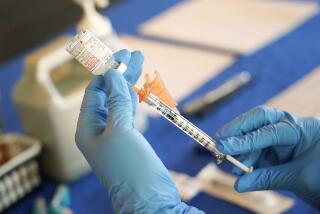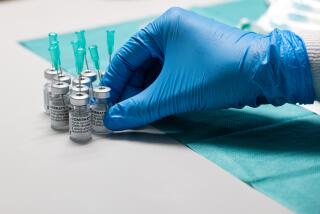How to Pay for Vaccine Plan Remains Unsettled : Health: A tax to fund the $1.1-billion free immunization program for children is expected to be part of broader reform package.
- Share via
WASHINGTON — Clinton Administration officials have not yet decided how to pay for a proposed $1.1-billion program announced Thursday that would provide free vaccinations for all American children.
Under the Comprehensive Children’s Immunization Act, which was formally submitted to Congress, the government would buy vaccines from manufacturers and distribute them to private doctors and public clinics across the country.
While Administration officials declined to specify what kind of tax they favor to pay for the program, they said that it would be included in the larger national health care reform package scheduled to be unveiled in May.
The vaccines program would “become a cornerstone in the Administration’s national health care reform plan,” said Secretary of Health and Human Services Donna Shalala, “a plan that will emphasize prevention and provide all Americans with the security of knowing that their basic health care needs will be met.”
Although the President and other officials have publicly discussed such plans before, the proposal marks the Administration’s first step into regulation of an industry that so far has flourished in an unregulated open market.
But what the Administration touted as the next, great step in children’s welfare met strong opposition from the pharmaceutical industry, which protested that the new law would dry up their profits and force severe cuts in industry spending to develop new vaccines, if not force them out of the immunization business altogether.
“You have to be able to afford the luxury of serendipity and that can be expensive” said Pamela Adkins, director of communications for Merck & Co., a vaccine-manufacturing firm. “Science is not a logical thing and you never know where your next breakthrough is going to occur.”
Dr. Ronald J. Saldarini, president of Lederle-Praxis Biological, a division of the American Cyanamid Co., warned that, if the Administration’s plan passes Congress, his company might be forced to abandon research it is now conducting on vaccines for herpes, AIDS and infant diarrhea.
“If I can’t be sure that the purchaser will be sure to allow me to price the product at a price commensurate with my investment, I may not want to make that investment,” he said.
Government officials charged that vaccine costs must be reined in after a decade in which the public saw the prices of some childhood immunizations rise more than 1,000% in three years.
“Much of this price increase in recent years has been from the approval of new vaccines and for the support of the compensation program for children with vaccine reactions,” Rep. Henry A. Waxman (D-Los Angeles) said at a press conference announcing the Administration plan, “but the end result for parents is the same--they have to dig deeper to provide basic protection.”
More to Read
Sign up for Essential California
The most important California stories and recommendations in your inbox every morning.
You may occasionally receive promotional content from the Los Angeles Times.













